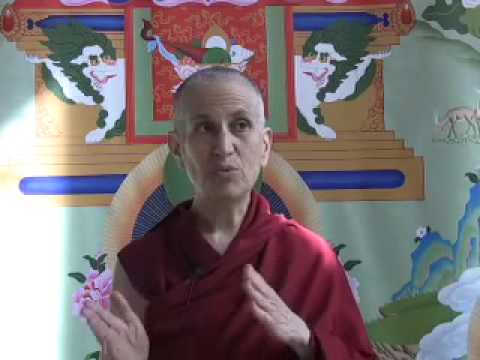Verse 40-7: Consideration for others
Part of a series of talks on the 41 Prayers to Cultivate Bodhicitta from the Avatamsaka Sutra (the Flower Ornament Sutra).
- Helping us restrain negative actions
- Respecting ourselves and our Dharma practice
- Respecting others, their practice, and their welfare
41 Prayers to cultivate bodhicitta: Verse 40-7 (download)
“May all beings attain the seven jewels of an exalted being (faith, ethics, learning, generosity, integrity, consideration for others and discriminating wisdom).”
This is the prayer of the bodhisattva when seeing someone engaged in business.
We’re talking about the seven jewels of the aryas. We started with faith, ethics, learning, generosity, and yesterday we did integrity. Integrity’s companion, consideration for others, is the one we’ll do today.
Like I was saying yesterday, these two, integrity and consideration for others, are what manifest in the mind that help us to restrain from committing negative actions. We have integrity because we respect ourselves and we respect our own Dharma practice, and consideration for others because we respect others and care about their Dharma practice and welfare.
This is to emphasize consideration for others. It’s so important because what we do affects other living beings. In my work with inmates, this is one of the big things that many of them realize: “Oh, other people are affected by my actions.” That’s when their lives really start to turn around. Especially when we’re Dharma practitioners, and especially when we’re monastics and more visible. How we act, what we say, how we move, all these kinds of things influence other people quite directly. For better worse they may get an impression of the Dharma because of how we are.
Now of course, it’s not fair for people to judge an entire religion on the behavior of one person, but they do sometimes. Especially if they’re not Buddhist. If we are really being loud and obnoxious, or not keeping our precepts well, then that can really turn somebody’s mind completely away from the Dharma, which is extremely damaging to them not only in this life but for future lives. Whereas, if we’re acting kind and considerate, and so forth, then when we’re out in public (or even here at the abbey), when guests come and also with each other, then it reinforces people’s faith in the Dharma because it shows them that it works and that there is an effect in that Buddhists are kind of nice people. What we do has a very powerful effect.
I remember when Christian from Montana came here with her family and I was talking with her. She was about eleven at that time and her brother was maybe thirteen and I was talking with them in the kitchen. We were peeling apples. She said, “Oh, the people at the Abbey are so nice.” I mean that’s what she knew as an eleven-year-old. That really sat in her mind and her mother said when she went back home she would remember that. Our actions do affect others and we don’t want to damage anybody’s faith or discourage anybody or make anybody cynical. When we really care about others then we use that to restrain ourselves from committing negative actions.
Venerable Thubten Chodron
Venerable Chodron emphasizes the practical application of Buddha’s teachings in our daily lives and is especially skilled at explaining them in ways easily understood and practiced by Westerners. She is well known for her warm, humorous, and lucid teachings. She was ordained as a Buddhist nun in 1977 by Kyabje Ling Rinpoche in Dharamsala, India, and in 1986 she received bhikshuni (full) ordination in Taiwan. Read her full bio.


